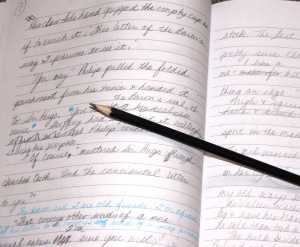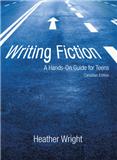
I know that I’m a day late, but … well, November seems like such an innocuous month and then, kapow, there’s no time for anything–and I celebrated Thanksgiving in October! Anyhow, here’s hoping I can stay on track a little better now. I hope those of you south of my border had a wonderful Thanksgiving weekend and that you’ve all been able to squeeze in some good times with friends and family.
Once school is out at the end of next week, I will definitely be hunkering down in front of the fire with some much-needed journal time. I find that writing with pen or pencil on paper really helps my creativity, and I have a lot of projects waiting for my attention right now. I write for other people on my computer, and for me in my journal. Do you find that changing your writing tools makes a difference to your output?
Here are the last writing prompts for 2014. Have fun and I hope you can find some creative time in the busy holidays ahead.
1. Use one, some, or all of the following words in a story or poem
- smart phone, cup, nail, sky, bend, yellow
- envelope, bowl, mist, date, wind, light
2. See if one of the following titles suggests a story to you: The Black Castle, Blue Eyes, Dream Keeper, Once Upon a Crime, On File, An Elf’s Life, Christmas Love, Holiday Harry, The Next Morning.
3. Here are some opening lines for you to try:
- You can’t be late.
- The screen went black.
- Joe always wanted to know what his father looked like.
- There are times when it just doesn’t pay to get out of bed in the morning.
- Sir, there are only enough supplies to last for three more days.
- Explain to me again why it was a good idea to volunteer for this.
- No one expected to hear a noise from underneath the stairs.
4. What scene can you imagine from these lines of dialogue?
- This came in the mail for you.
- Fine. Just leave it there.
- Aren’t you going to open it?
- Look at the return address.
- Henry, did you hear what I said?
- Sadly, yes.
- So what are you going to do about it?
- Absolutely nothing.
- Hey, look at this!
- What is it?
- Dangerous.
- Mike, what are you doing here?
- Thanks for making me feel so welcome.
- I’m glad you didn’t think I was being too subtle.
- You’re hiding something. Show me.
- Here.
- Oh.
- Now what do we do?
5. Take some time this month to get to know your characters better. Chat with them over coffee (while no one is around of course) and find out what they’re thinking. Have you been giving them too much trouble, or not enough? What secret to they have that you didn’t know about. Ask your characters the ten Bernard Pivot questions that James Lipton asks his guests on the Actor’s Studio. Think about their answers. What have you learned about your characters that you didn’t know before? For fun, ask yourself the questions, too!
- What is your favorite word?
- What is your least favorite word?
- What turns you on?
- What turns you off?
- What is your favorite curse word?
- What sound or noise do you love?
- What sound or noise do you hate?
- What profession other than your own would you like to attempt?
- What profession would you not like to do?
- If Heaven exists, what would you like to hear God say when you arrive at the Pearly Gates?
If you’re looking for gifts for your teen or pre-teen, please check out my books page.

